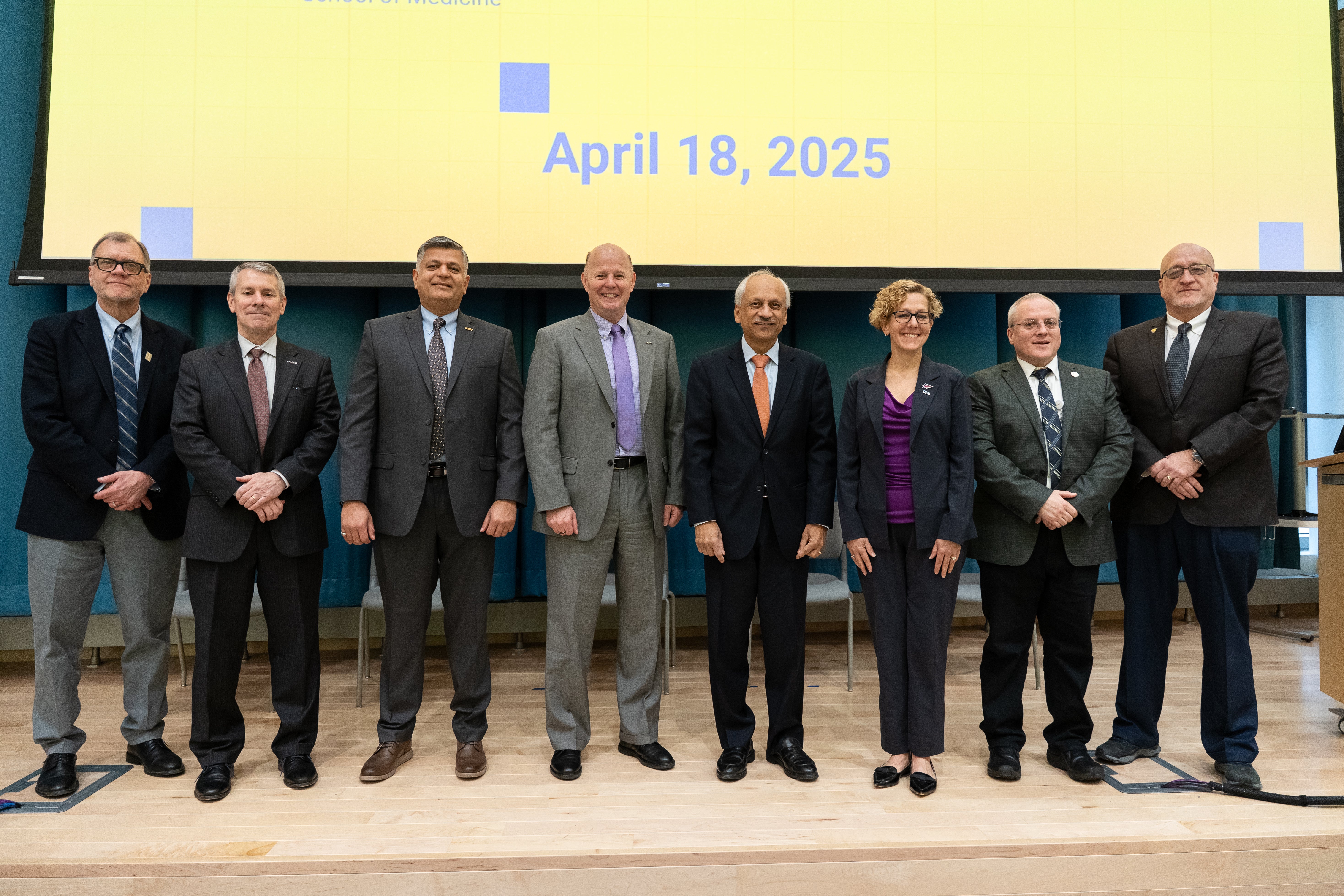
By Kat Procyk
Photography by Rayni Shiring, University of Pittsburgh
The University of Pittsburgh and the technology company Leidos announced a $10 million partnership to advance Pitt’s Computational Pathology and AI Center of Excellence (CPACE) on Friday, April 18, 2025.
The first focus of the five-year collaboration will be developing AI-powered tools for quicker detection of diseases, like heart disease and cancer, reducing diagnostic turnaround times and enabling earlier, more effective care management.
This partnership merges academic excellence and technological innovation, acting as a catalyst to expand Pitt’s impact in applying AI to health care—both regionally and beyond.
Anantha Shekhar, senior vice chancellor for the health sciences and John and Gertrude Petersen Dean, School of Medicine, said digital pathology will become the “gold standard” for all pathology diagnoses during a joint announcement ceremony with Leidos in Alan Magee Scaife Hall’s West Wing auditorium.
“When considering digital versus human pathology—led by highly trained and renowned pathologists—part of the challenge is that no matter how intelligent or experienced you are, it's impossible to retain all relevant information at the moment of diagnosis,” Shekhar said. “This isn’t going to only change how we think of pathology, but also the ability to collect this information longitudinally across millions of patients.”
Pitt’s Department of Pathology, recognized as one of the largest and most reputable in the United States, analyzes more than 24 million pathological specimens across Pennsylvania each year. Despite its scale and longstanding leadership in the field, the department faces a significant challenge: it lacks the workforce necessary to keep pace with growing demand, said Liron Pantanowitz, Dr. Maud L. Menten Professor of Pathology and chair, Department of Pathology, School of Medicine.
“These tools make it possible for our work to reach patients and personalize their health care,” Pantanowitz said, referring to emerging technologies designed to augment clinical capacity.
To help address the gap, the partnership between Pitt and Leidos will strengthen CPACE’s position as a health care leader in the AI space. In just 14 months since its founding, the center has assembled a multidisciplinary team of faculty, researchers and software developers. CPACE continues to disseminate AI knowledge while developing innovative tools and applications aimed at enhancing clinical practice.
AI models can predict cardiovascular disease with nearly 90% accuracy by analyzing and correlating imaging and patient history, leading to early intervention that improves patient outcomes, reduces invasive procedures and saves patients more than $10,000 annually, according to Liz Porter, president of Leidos’ Health and Civil Sector.
Hooman Rashidi, associate dean of artificial intelligence in medicine and professor of pathology, School of Medicine, and executive director of CPACE, said Leidos’ investment into CPACE will help patients in rural and other underserved areas receive the same early diagnosis and cutting-edge treatment plans as those living near top medical centers.
“At the end of the day, the mission of CPACE reflects that of both Pitt’s schools of the health sciences and Leidos to solve some of the most pressing health, research and educational problems so both patients and the workforce can benefit.”
The relationship between Pitt and Leidos far predates its most recent investment. Over the past 17 years, Pitt and Leidos have collaborated on 355 projects across 40 academic departments, engaging more than 80 faculty and representing more than $37 million in collaborative work.

Caption: Hooman Rashidi and Liz Porter
